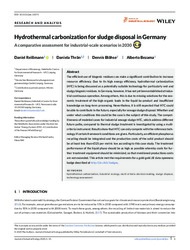Hydrothermal carbonization for sludge disposal in Germany: A comparative assessment for industrial-scale scenarios in 2030
DOI: https://doi.org/10.1111/jiec.13073
Persistent URL: http://resolver.sub.uni-goettingen.de/purl?gldocs-11858/9278
Persistent URL: http://resolver.sub.uni-goettingen.de/purl?gldocs-11858/9278
Reißmann, Daniel; Thrän, Daniela; Blöhse, Dennis; Bezama, Alberto, 2020: Hydrothermal carbonization for sludge disposal in Germany: A comparative assessment for industrial-scale scenarios in 2030 . In: Journal of Industrial Ecology, DOI: 10.1111/jiec.13073.
 |
Dokument öffnen: |
The efficient use of biogenic residues can make a significant contribution to increase resource efficiency. Due to its high energy efficiency, hydrothermal carbonization (HTC) is being discussed as a potentially suitable technology for particularly wet and sludgy biogenic residues. In Germany, however, it has not yet been established at industrial continuous operation. Among others, this is due to missing solutions for the economic treatment of the high organic loads in the liquid by-product and insufficient knowledge on long-term processing. Nevertheless, it is still expected that HTC could be able to contribute in the future, especially for sewage sludge disposal. Whether and under what conditions this could be the case is the subject of this study. The competitiveness of modeled cases for industrial sewage sludge HTC, which address different future paths, compared to thermal sludge treatment is investigated by using a multi-criteria instrument. Results show that HTC can only compete with the reference technology if certain framework conditions are given. Particularly, an efficient phosphorus recycling should be integrated and the production costs of the solid product should be at least less than €325 per metric ton according to this case study. The treatment performance of the liquid phase should be as high as possible whereby costs for further treatment equipment should be minimized, so that mentioned productions costs are not exceeded. This article met the requirements for a gold-gold JIE data openness badge described at http://jie.click/badges.
Statistik:
ZugriffsstatistikSammlung:
Schlagworte:
hydrothermal carbonizationindustrial ecology
multi-criteria decision-making
sludge disposal
technology assessment
This is an open access article under the terms of the Creative Commons Attribution License, which permits use, distribution and reproduction in any medium, provided the original work is properly cited.

